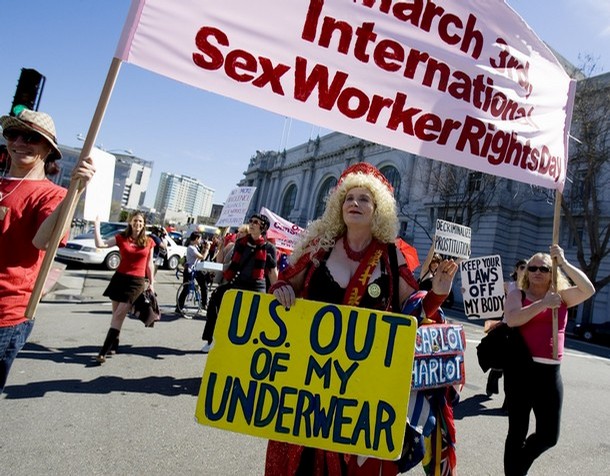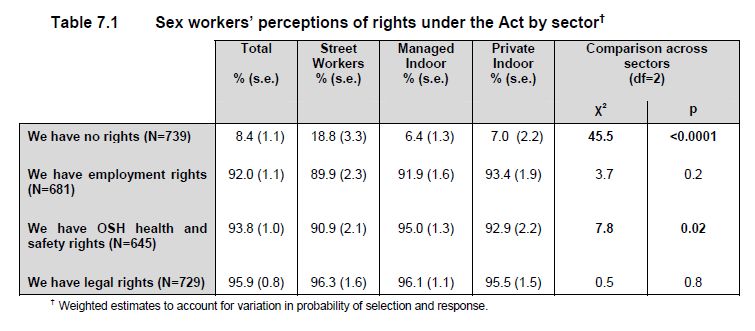Over 30 years of anarchist writing from Ireland listed under hundreds of topics
So much for Solidarity - ICTU and sex workers
Date: Thu, 2014-04-10 08:02
 In 2012 The Irish Congress of Trade Unions (ICTU) made a submission to the Irish government’s public consultation on the prostitution laws. Most of it was just a cut-and-paste job of text sent to them by the Turn Off The Red Light campaign, which seeks the introduction of the Swedish model. But there is one part of ICTU’s original contribution which I found remarkable. A few paragraphs down the submission cites – clearly for the purpose of endorsing – the view of the Technical, Electrical & Engineering Union‘s General Secretary that “prostitution could not be considered work”.
In 2012 The Irish Congress of Trade Unions (ICTU) made a submission to the Irish government’s public consultation on the prostitution laws. Most of it was just a cut-and-paste job of text sent to them by the Turn Off The Red Light campaign, which seeks the introduction of the Swedish model. But there is one part of ICTU’s original contribution which I found remarkable. A few paragraphs down the submission cites – clearly for the purpose of endorsing – the view of the Technical, Electrical & Engineering Union‘s General Secretary that “prostitution could not be considered work”.
ICTU didn’t invent this view, of course. But it strikes me as taking on a much graver significance when held by trade unionists than by, say, radical feminists or religious puritans. Because the corollary of prostitution not being work is, of course, that the people engaged in it aren’t workers – and are therefore not entitled to the rights that trade unions (theoretically) exist to defend.
Effectively, what they’re saying to sex workers who want those rights is: piss off, and call us when you’ve found a real job.
This position puts ICTU at odds with the International Labour Organization, to which it is of course affiliated. While the ILO takes an officially neutral stance on the legal status of sex work, it has made abundantly clear that it recognises the sex industry as a de facto economic sector, and people who sell sex as engaging in a form of labour. In its groundbreaking 1998 report The Sex Sector: The Economic and Social Bases of Prostitution in Southeast Asia, for example, editor Lin Lean Lim proposes that
“For those adult individuals who freely choose sex work, the policy concerns should focus on improving their working conditions and social protection, and ensuring that they are entitled to the same labour rights and benefits as other workers.”
The international standards developed by the ILO also reflect this position – albeit impliedly rather than explicitly, in their frequent reference to “all branches of economic activity” (my emphasis). The 1981 Occupational Safety and Health Convention is an example. And what about the jurisdictions which have actually incorporated those standards into their own laws around sex work, such as New Zealand?
The table here, from Abel, Fitzgerald and Brunton's, “The Impact of the Prostitution Reform Act on the Health and Safety of Sex Workers” (2007) illustrates the outcome for sex workers.

The phenomenal figures in the last three rows of that table are the consequence of legislation which was expressly designed to treat sex work as work – legislation, in other words, designed to do exactly what ICTU says the law shouldn’t do. And thus ICTU, which is a trade union body hence theoretically a workers’ rights organisation, would reject a framework agreed to be rights-protective by over 90% of the workers operating within it, because they don’t consider them “workers” to begin with. ICTU policy would take those rights away from them.
I’ve been racking my brain trying to think of a parallel to this extraordinary situation, and I’m honestly stymied. Even considering the obvious context – disapproval of prostitution as a matter of principle – I can’t think of another sector in which the “solution” would involve the wholesale rejection of labour rights for those involved.
I cut my political teeth in anti-war and anti-nuclear campaigning, and I don’t recall anything remotely comparable to this. We may have wanted to decommission the bases and power plants but we never said labour law shouldn’t apply to people working at them.
Nor can ICTU’s position be justified on the basis that sex work isn’t really a choice. The term “work” may be deemed inappropriate for actual forced labour, the labour of someone who is literally enslaved – but ICTU, like all but the most fanatical fringes of the anti-sex work movement, don’t seem to think that most in the sex trade fall into this category.
Instead, their submission refers to the “poverty, past history of abuse or limited life choices” that push people into prostitution. But ICTU don’t see it as “not work” when poverty and limited options push people into unappealing jobs outside the sex sector – and they would never dream of opposing legislation to give those workers labour rights.
In some respects, this betrayal isn’t really a surprise: the Irish trade union movement has a long history of selling out Irish workers, especially those at the margins. (They also have a history of an undemocratic, top-down style of leadership which seems to be reflected here as well: nobody I know in any of the ICTU-affiliated unions was asked for their opinion of this submission before it went in.) But summarily excluding a whole sector of the economy from their remit, and refusing to defend the labour rights of the (particularly vulnerable) people dependent on it? That’s a new low for them, and it’s a shocking one.
WORDS: Wendy Lyon
This article originally appeared on the Feminist Ire blog: http://feministire.wordpress.com/
They aim to create a space for those on the margins and between the lines, to question traditional ideas about identity, about sexuality, about who we are and where we should be going.
This article is from issue 9 of the Irish Anarchist Review - Summer 2014



Comments
International Labour Organisation
Just a small correction. It is the Irish government, not ICTU, which is affiliated to the International Labour Organisation. The ILO is a United Nations agency, similar to the World Health Organisation or UNESCO. When a government signs AND then ratifies an ILO convention it is supposed to make it part of that country's law. That's why so many states sign human rights conventions but never seem to get around to ratifying them!